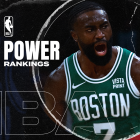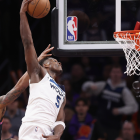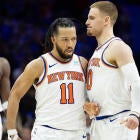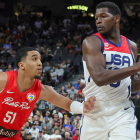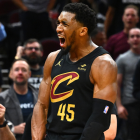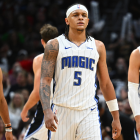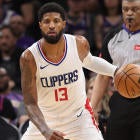
NORTH AUGUSTA, S.C. -- He stands out as much as he blends in. Maybe that's the best compliment to seeing 72-year-old Larry Brown grinding on the recruiting trail here at the Peach Jam. The second-year SMU coach (who was inducted into the Naismith Basketball Hall of Fame more than a decade ago) looks natural in this habitat, the gym.
A year removed and with plenty needed to prove, Brown doesn't seem over his head or a relic. He knows the prospects better this summer, and the rhythm of recruiting seems to not be wearing him down. In between the 90-minute AAU games that feature way too many fouls and even more turnovers, Brown walks the halls of the Riverview Park Activities Center. It's there that he can't go but 10 feet without someone coming up to say hello, shake a hand, tap a shoulder. Old or young, known or not.
"Remember now, if I still hang around, you gotta come play with me," Brown says to a 7-year-old, who smiles before happily walking away with a few jealous friends. (For the record, there is zero chance that Larry Brown is coaching college basketball 11 years from now, when this child will be eligible. At least I think that has to be the case.)
"I know I've got to do a better job coaching," Brown says after the boy leaves. "We had to go through a lot of changes. A lot of kids left. When I got here last year, we were so far behind."
He's referring to that 15-17 SMU campaign that produced no games beyond C-USA play. For next season, when SMU will be a part of the American Athletic Conference, Brown is telling pretty much everyone that his team will be not only better but downright good. There was a boost in recruiting, of course; the incoming class -- spearheaded by recruiting sage Jerrance Howard, who left Brown's staff at the end of May to join Bill Self at Kansas -- will have two top-40 shooting guards.
Brown dealt last year with some expected instability and uncertainty. That only continued with Howard's departure. That effect mirrors Brown's biggest criticism of college athletics, the most typical one: He hates the new geography of conferences and the manslaughter of rivalries that it has caused.
"I really didn't know what to expect, to be honest with you," Brown said. "A lot of things have changed, too. We thought we were going into the Big East, and now the college landscape is so out of whack. Basketball and other sports have really suffered. They ought to have a football conference and let others have [their own conference].'"
Brown ticked off every dead rivalry in college sports. Texas-Texas A&M, Missouri-Kansas, Maryland-Duke, etc. But give him credit here; he also knows every team in the American Athletic Conference, which I suppose he should, but plenty of coaches are still practically using flash cards in certain leagues to stay up to date. Unprompted, Brown listed off the league's squads and, if anything, seems engaged and uplifted about what SMU stands to do while he's there.
"I love it," Brown said. "Love the kids. Just hopeful I can help them and do better."
How'd it get like this? Why is Larry Brown even invigorated or knowing -- despite a losing record last year -- that this was the right decision? He said leaving the coaching game on his own accord for two full years, something that he never had done, was what revitalized him. He traveled the country and visited/watched coaches, including Jay Wright, Mark Turgeon, Tad Boyle at Colorado, John Calipari and Self. These are all men whom he credited with inspiring him not only to coach again but to coach in college.
"I feel I've been taught so much and still want to share what I've learned," Brown said. "I want to keep doing it."
Now, about that NBA question. The Brad Stevens question. He has been answering a lot of it lately. Brown remains the most successful example ever of a coach going from college to the pros and finding success (read: an above-.500 record). What's the secret, Larry?
"A lot of people always say, 'Well, you're the only college coach that's made the jump and been successful,'" Brown said. "But the reality is, none of those guys -- me included -- nobody gave us a great coaching job in the NBA."
Brown recalled how abruptly he left UCLA for the New Jersey Nets in 1981. His career there nearly ended before it began. What if Brown had never become an NBA coach? Could've happened.
"A lot of new [stuff] was happening," Brown said of his Nets gig in '81. "They had eight new owners, and they were ready to fire me after a month and a half. But one owner stood up for me."
He cited the playoff run in his initial season, then going to San Antonio six years later, when his team failed in the first year. But he was given an opportunity that other guys weren't. A chance to be successful. The places that he felt he was successful, it was about being attached to the owner "at the hip" and having a close relationship with the general manager.
"One voice, one direction, Brad needs that," Brown said. "He's a phenomenal young man, and if you can coach, you can coach. I don't care if it's high school, college or pro. It takes adjustment, like with me being a college coach now."
Not that it's realistic to think Brown would ever get or consider another NBA job at this point in his life, but his closing remarks on Stevens to the Celtics and on what the NBA is now pretty much sum up why he's embracing college basketball.
"If you're the college coach, you're a coach," Brown said. "It doesn't happen in the NBA. That's a big problem, in my mind, in the NBA. Now you've got these analytic guys. You've got these guys that are drafting players they think you should play. It's ass backwards. You get a coach, you find out what style he plays and get him those players -- or get another coach. Look at San Antonio. Look at Donnie Walsh [with the Pacers]. Look at Utah and Kevin O'Connor. There's one voice. They might disagree; nobody knows [publicly]. They're all on the same page. If there's a basketball matter, the coach handles it. If it's a business matter, the business manager handles it. You don't have enough of that going on. To me, NBA [franchises] are like a major corporation now. Each guy cares about his ass. I don't think Brad's going to find that. Danny [Ainge] handpicked him, and I don't think they're going to be as bad as people say because, if you have a great point guard, you can win in the NBA. He has a great point guard [Rajon Rondo]."
Brown's knowledge and savvy about coaching is almost never questioned, yet skeptics and critics still do question whether SMU can actually become relevant. That's fair. But beyond that rebuild project, it remains remarkable that a coaching legend not only lives among an ever-competitive, ever-young, ever-fierce circle of colleagues, but that he competes and tries to give back as much as any of them. And, somewhat unpredictably, has come to identify more with college than the NBA.













